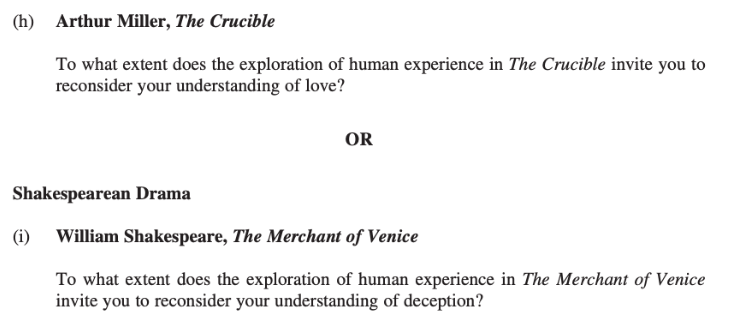When I was completing year 12, I discovered a simple trend when completing HSC English – you either love it, or you hate it. HSC English is the only compulsory subject required for you to complete and while many students are more mathematically or scientifically gifted, studying your required texts is a must for success in your ATAR.
As HSC crunch-time approaches, it is worth considering the various ways you can prepare for your HSC English exam. Here are some tips that will prepare you for your exam.
Table of Contents
Yes, you have to read your texts
During year 12, I kept hearing of ‘advice’ from past students stating, “you don’t need to read your text, just read a summary”. FALSE! The HSC English syllabus was re-written commencing in 2019 to stop this exact process from occurring.
As evident in the first year of the new syllabus, questions are now detailed, theme-orientated and specific. Let’s take a look at a couple of these questions from last year’s HSC exam.

The two above examples demonstrate the unpredictability of the modern HSC English exam. I will tell you first-hand and from the views of friends from other schools, many of these themes were only briefly touched on during school time.
Therefore, understanding all themes from your prescribed text will be key in allowing you to have a great understanding of any of the topics that may be thrown at you.
Answer the Question
Being prepared for your exam is only half the process. The other half is making sure you answer ALL questions in your exam to the best of your ability. Your ability to answer the essay question well is the first thing the HSC marker is looking for, from the start of your introduction.
This is why you need to insert the words of the question into a short and snappy thesis for the marker (who is often speed-reading) to immediately place yourself in the top bands. I will stress, the question must not only be answered in the introduction of your piece, but be evident consistently throughout your essay, where you should be linking back to the words of the question at the end of each paragraph.
But how can I prepare for these questions? I understand, being a new year to the syllabus there is a limited amount of questions available to you. But this should not stop your ability to interact with new questions as part of your study.
So I’m suggesting to find past trial exams from other schools that fit your text. Ask your teacher to give you a question to answer. Whatever it may be, the best way to prepare yourself for the unpredictability of the HSC is to keep completing questions, especially under timed conditions when the exam begins to approach.

Do not memorise
As I indicated above, there is no way you can memorise all your essays and expect to achieve a great mark in this way. This essay will only be satisfactory AT BEST. Many students fall into the trap of writing the exact same essay they used in previous assessment tasks and will become too complacent to develop a new strategy. This is the difference between a great essay and a mediocre essay.
In entering the exam, your greatest change at succeeding is to create a series of essay plans and outlines to help you break down your essay ideas into simple points. This may involve having a few extra quotations up your sleeve in case the question isn’t your first choice preference. Memorising an essay will not allow you to improvise during the exam and will keep you struggling for time which should be utilised planning how you are going to adapt to the question.
Gain feedback
There is no use writing a new essay if you are not going to ask for feedback. So whenever you have written a new essay, ask your teaching to take a look at it. Your teacher will provide you with key points which you should consider to improve your essay-writing skills for the next time and will enlighten you on your journey of improvement throughout the year. I get it, sometimes teachers rarely respond to your constant emails and often provide you unclear feedback on your writing.
So I encourage you to ask your teacher specific questions on your writing to avoid getting a vague response. For example, don’t just ask “Ms can you take a look at this essay”. Instead, attempt to be more specific, like “Ms do you feel as though my topic sentence successfully links back to what I have introduced in my thesis or is there a way I can make this more clear”. By drawing your teacher’s attention specifically to an area of concern, you are more likely to improve your phrasing.
Additionally, ask a friend or even a family member for advice. When we are writing, we often do not see our mistakes first-hand and a phrase which may appear like it makes sense, may in fact not. This is why even this article you are reading was also read by the publisher. So seek advice from another student for advice. I sometimes found this more useful than asking a teacher as my friends were often blunt with me and could provide advice on the same mistakes that they made.
Think outside the box for your Module C piece
The new HSC English syllabus requires you to have understanding on how to write a creative story, a discursive piece or a persuasive essay. Therefore, you must experiment with all these structures and find which suits your writing skills the best. The pieces that stick out the most to HSC markers are those that are unique, descriptive and clear. Simple is not bad.
Instead of writing a highly plot driven story with 10 different scenes and twists and turns, be clear, introduce limited characters and have a clear setting and plot. The question you will be asked for Module C is going to be very flexible. Be sure to engage with the stimulus and have a few ideas in mind before entering the exam. Also, spend 5-10 minutes planning your piece as this will provide you direction and structure.
Good Luck
Overall, the HSC English Exam is one of the most stressful and unpredictable exams you will have to take. By being strategic in response to your questions, you will be organised, prepared and have limited anxiety as the exam approaches.
With these tips, you will sharpen your analysis and writing skills, allowing you to ace your exam.

